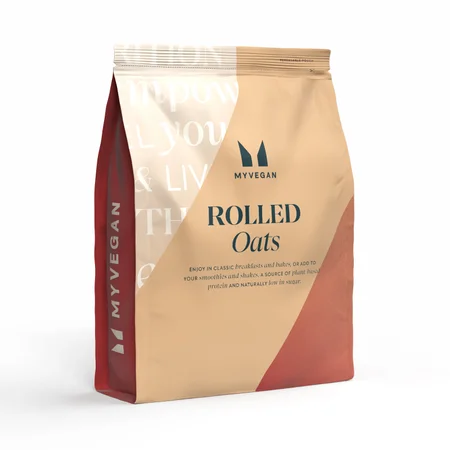Maintain A Healthy Weight & Reduce Inflammation | Nutritionist Explains Fibre

Everyone’s favourite nutrition expert is back on the Myprotein YouTube channel with another deep dive into your burning nutrition questions. This time we’re talking fibre. We all know we should eat more of this elusive carbohydrate, but perhaps we’re not sure why.
As Richie says, fibre isn’t the “sexiest” nutrition topic, but it is incredibly important in your diet. So, over to him to explain exactly why you need fibre, how it works, and how it affects your health.
What is fibre?
What you might not have realised is that fibre is classed as a carbohydrate.
This is because “the basic unit of carbohydrates are simple sugars or monosaccharides like glucose or fructose”.
And when glucose molecules link together in a long chain, a type of polysaccharide known as starch is formed. Some of the most common forms of fibre can also be polysaccharides.
Richie explains that fibre can be divided into two types — insoluble fibre like that found in bread, oats, brown rice and some cereals, and soluble fibre that dissolves in water and is found in food like fruits and veg.
But perhaps the most notable characteristic of fibre is that we can’t digest it.
While this point leads some people to think that fibre is actually totally unnecessary and take up diets like the carnivore diet, Richie provides a pretty simple answer to this argument: "you don’t need shoes, but life is definitely a lot better if you have them.”
Fibre has so many number of benefits — why would you deny yourself of them?
Benefits of fibre
1. “Better out than in”
First off, as Richie puts it, “let’s get the unsexy elephant out of the room”. Fibre keeps you regular.
It does this by absorbing water in your gut to bulk up your stool and get your digestive system moving, preventing constipation. And this is essential for good health — it ensures that our body can get rid of the things it doesn’t need after it’s absorbed all the good stuff.
2. Helps to maintain a healthy weight
Richie emphasises that fibre shouldn’t be seen as some “magic” trick to weight loss, but sticking to a diet with high-fibre whole foods might mean that you need less food overall.
“Fibre swells and expands in the digestive system”, so more low-calorie, high-fibre foods like fruits, veggies and oats in your diet means you’ll be less likely to crave more calorie-dense foods that aren’t as nutritionally dense.
3. Keeps the heart healthy and insulin resistance functioning
Insulin resistance is a “dulled ability to react to the insulin you produce when you eat carbs”. It can also lead to type two diabetes. So this one’s a bit of a no-brainer.
Richie also explains that those who eat a lot of fibre also tend to have lower long-term blood glucose, which signifies good glucose control.
Certain types of fibre — like beta-glucans that you’ll find in your morning oats — can help to lower cholesterol. This is done by “binding to waste cholesterol in your digestive system, which prevents your body from re-absorbing it”.
4. Gut microbiome function
One of the benefits Richie is really excited about — it’s currently a huge area of research — is how fibre feeds your gut microbiome. But you might be wondering “what on earth is my gut microbiome?” Us too. Richie explains that your gut microbiome is “the environment of different bacteria that live inside your gut, and it plays a massive role in your health”.
Eating a variety of fibre regularly helps to feed the bacteria in your gut microbiome and allows beneficial bacteria to survive (and thrive) in there. And these bacteria aid things like immune response, insulin sensitivity, and digestion.
5. Reduction in inflammation
Likely another positive result of feeding our gut microbiome all that fibre is a reduction in inflammation. Although Richie explains that inflammation is usually an immune response, and is totally normal, many people can suffer from chronic inflammation due to lifestyle choices.
But those with high-fibre diets tend to show lower levels of inflammatory markers in their blood — that's a good sign!
There are tons of other benefits of fibre. Richie says he could go on for hours talking about them. But these are the key things to remember about why you should be upping fibre.
How much fibre do you need?
Ok, so now we know about the wonderful effects of fibre, how much should you consume?
Most countries have a recommendation of 25-35g of fibre per day. But Richie explains that on average, many people in Europe are getting a lot less — more like 16-24g per day.
This is likely due to the wide availability of processed foods, which can often take over from whole foods in our diet. Many food processing techniques specifically remove fibre, turning whole wheat into white flour, brown rice into white rice, or fruit into fruit juice.
How can I increase my fibre intake?
1. Eat more whole foods
Richie’s first tip is to eat more whole foods. He recommends making a few easy swaps like going from refined cereals to wholegrain cereals, swapping white for wholewheat bread, white rice for brown rice, and white pasta to wholewheat pasta.
Also try stocking your cupboards with foods like beans and lentils, which are cheap, easy to find in supermarkets and pack a fibre punch.
2. Aim for two portions of fruit and veg at every meal
Add a handful of fruit and veg to every meal. Try a handful of berries and a banana at breakfast, or some baked beans and a few trees of broccoli at lunch. This is a simple rule of thumb to help you get more fruit and veggies in, and therefore more fibre.
3. Cut down on processed foods
This will be made much easier once you’ve made a few more whole-food swaps, which will help keep you fuller for longer. Try reducing processed snack foods like sweets, cakes and pastries and adding a few whole-food snacks like nuts, dried fruits and nut butters. But don’t worry, Richie doesn’t say to cut them out completely — it's all about balance.
But remember...
Making changes to your diet can be a bit of a shock to your body, and adding all that fibre will be a bit of a shock to your digestion. So here are a couple of things to remember.
1. Add fibre gradually
It can take a while for your gut and digestive system to get used to processing all the extra fibre, so don’t go all-in straight away. Otherwise there could be some unwanted side effects in the bathroom...
2. Consult your GP
You should always consult your doctor before making any big changes to your diet, especially if you already suffer from conditions like IBS, IBD, colitis or Crohn’s disease.
Take home message
Fibre has a huge number of benefits, and deserves far better than its reputation as the “unsexy elephant in the room”. Adding it into your diet doesn’t just help your gut microbiome and digestion to keep ticking over, it can also help maintain a healthy weight, and prevent inflammation.
Add fibre gradually into your diet, and you’ll be feeling these benefits in no time.
READ THESE NEXT:







